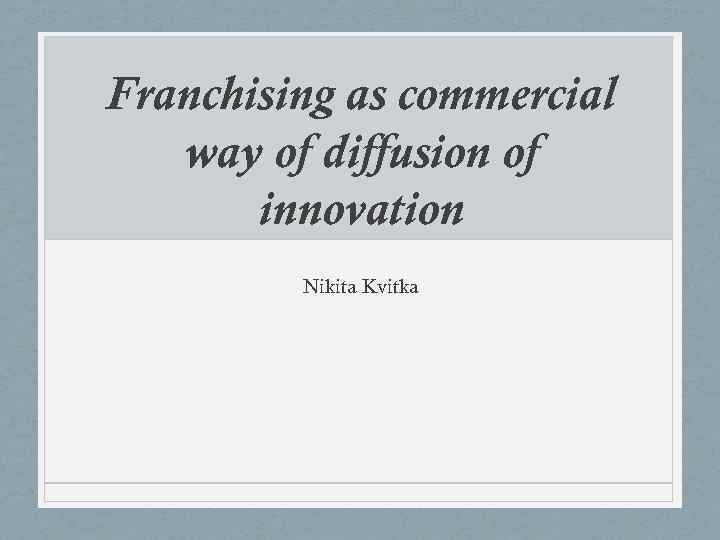 Franchising as commercial way of diffusion of innovation Nikita Kvitka
Franchising as commercial way of diffusion of innovation Nikita Kvitka
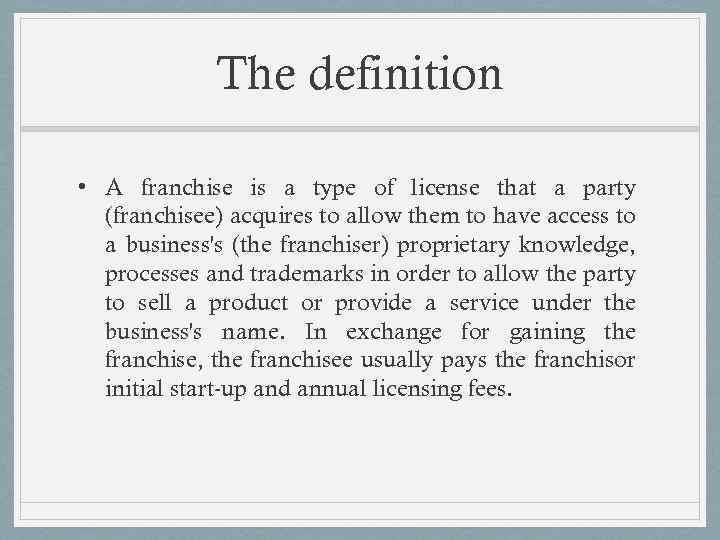 The definition • A franchise is a type of license that a party (franchisee) acquires to allow them to have access to a business's (the franchiser) proprietary knowledge, processes and trademarks in order to allow the party to sell a product or provide a service under the business's name. In exchange for gaining the franchise, the franchisee usually pays the franchisor initial start-up and annual licensing fees.
The definition • A franchise is a type of license that a party (franchisee) acquires to allow them to have access to a business's (the franchiser) proprietary knowledge, processes and trademarks in order to allow the party to sell a product or provide a service under the business's name. In exchange for gaining the franchise, the franchisee usually pays the franchisor initial start-up and annual licensing fees.
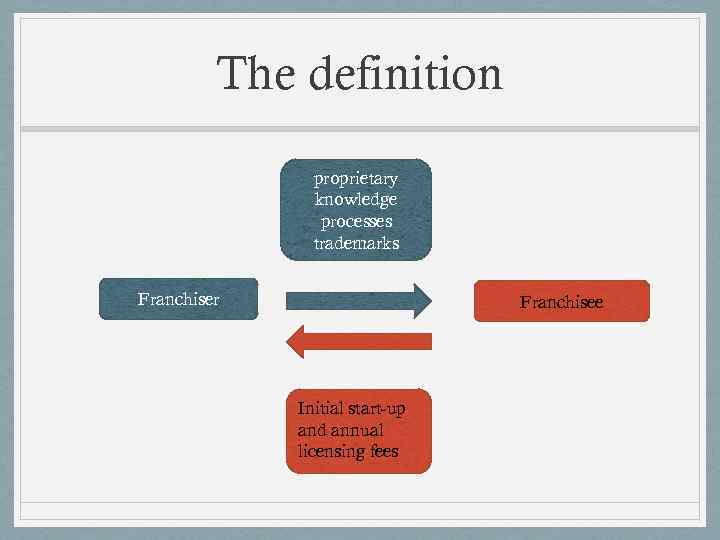 The definition proprietary knowledge processes trademarks Franchiser Franchisee Initial start-up and annual licensing fees
The definition proprietary knowledge processes trademarks Franchiser Franchisee Initial start-up and annual licensing fees
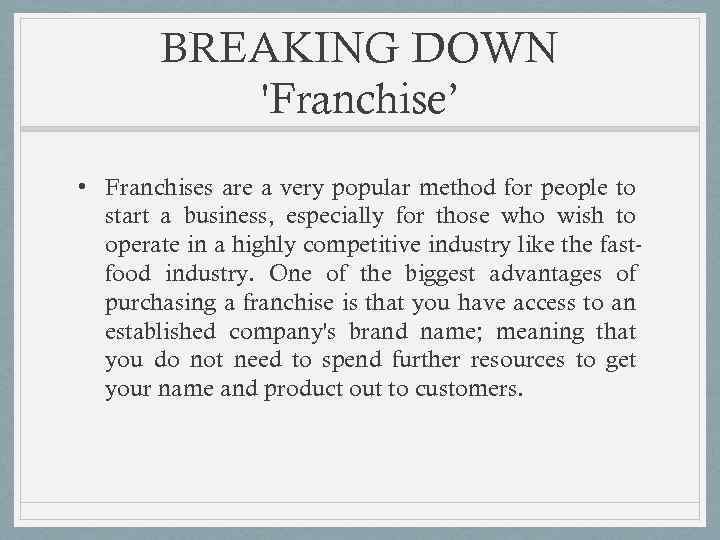 BREAKING DOWN 'Franchise’ • Franchises are a very popular method for people to start a business, especially for those who wish to operate in a highly competitive industry like the fastfood industry. One of the biggest advantages of purchasing a franchise is that you have access to an established company's brand name; meaning that you do not need to spend further resources to get your name and product out to customers.
BREAKING DOWN 'Franchise’ • Franchises are a very popular method for people to start a business, especially for those who wish to operate in a highly competitive industry like the fastfood industry. One of the biggest advantages of purchasing a franchise is that you have access to an established company's brand name; meaning that you do not need to spend further resources to get your name and product out to customers.
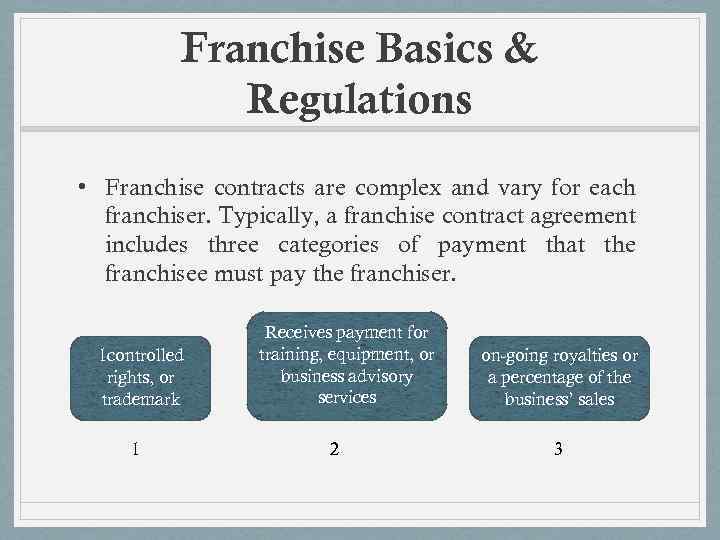 Franchise Basics & Regulations • Franchise contracts are complex and vary for each franchiser. Typically, a franchise contract agreement includes three categories of payment that the franchisee must pay the franchiser. 1 controlled rights, or trademark 1 Receives payment for training, equipment, or business advisory services 2 on-going royalties or a percentage of the business’ sales 3
Franchise Basics & Regulations • Franchise contracts are complex and vary for each franchiser. Typically, a franchise contract agreement includes three categories of payment that the franchisee must pay the franchiser. 1 controlled rights, or trademark 1 Receives payment for training, equipment, or business advisory services 2 on-going royalties or a percentage of the business’ sales 3
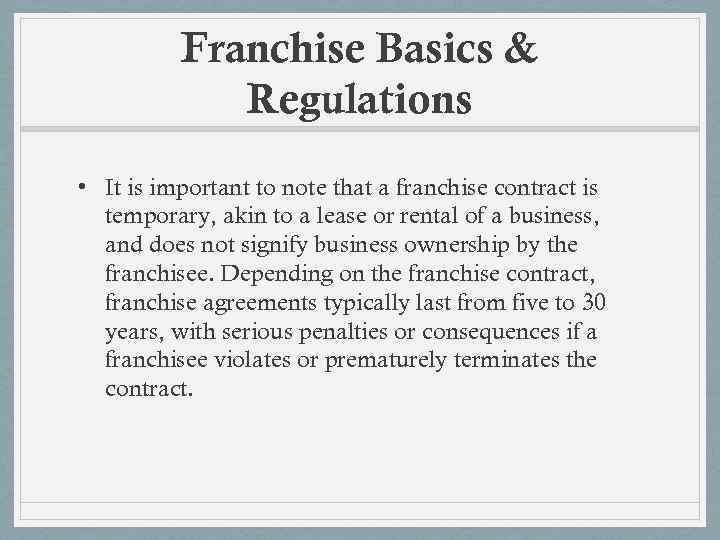 Franchise Basics & Regulations • It is important to note that a franchise contract is temporary, akin to a lease or rental of a business, and does not signify business ownership by the franchisee. Depending on the franchise contract, franchise agreements typically last from five to 30 years, with serious penalties or consequences if a franchisee violates or prematurely terminates the contract.
Franchise Basics & Regulations • It is important to note that a franchise contract is temporary, akin to a lease or rental of a business, and does not signify business ownership by the franchisee. Depending on the franchise contract, franchise agreements typically last from five to 30 years, with serious penalties or consequences if a franchisee violates or prematurely terminates the contract.
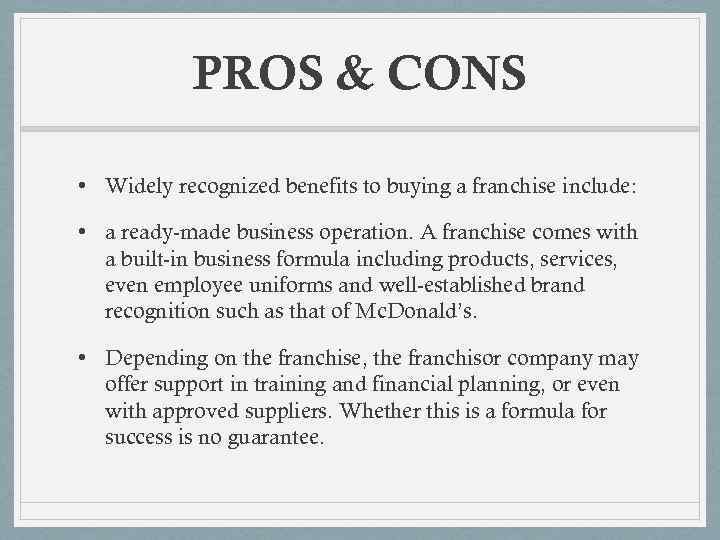 PROS & CONS • Widely recognized benefits to buying a franchise include: • a ready-made business operation. A franchise comes with a built-in business formula including products, services, even employee uniforms and well-established brand recognition such as that of Mc. Donald’s. • Depending on the franchise, the franchisor company may offer support in training and financial planning, or even with approved suppliers. Whether this is a formula for success is no guarantee.
PROS & CONS • Widely recognized benefits to buying a franchise include: • a ready-made business operation. A franchise comes with a built-in business formula including products, services, even employee uniforms and well-established brand recognition such as that of Mc. Donald’s. • Depending on the franchise, the franchisor company may offer support in training and financial planning, or even with approved suppliers. Whether this is a formula for success is no guarantee.
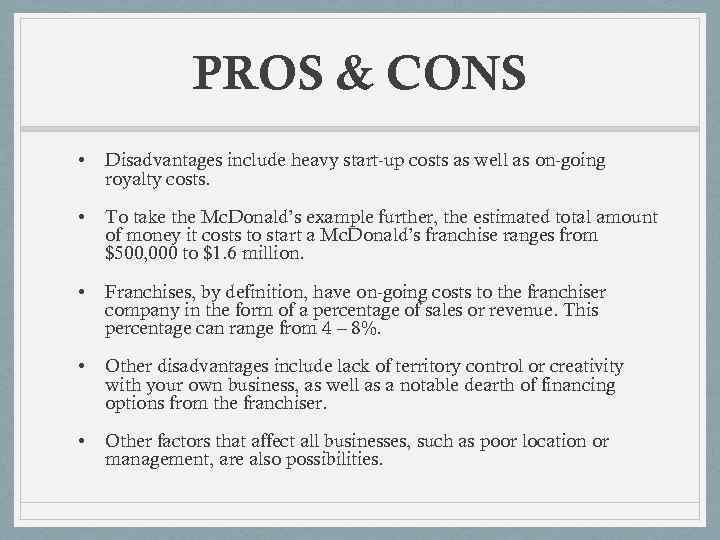 PROS & CONS • Disadvantages include heavy start-up costs as well as on-going royalty costs. • To take the Mc. Donald’s example further, the estimated total amount of money it costs to start a Mc. Donald’s franchise ranges from $500, 000 to $1. 6 million. • Franchises, by definition, have on-going costs to the franchiser company in the form of a percentage of sales or revenue. This percentage can range from 4 – 8%. • Other disadvantages include lack of territory control or creativity with your own business, as well as a notable dearth of financing options from the franchiser. • Other factors that affect all businesses, such as poor location or management, are also possibilities.
PROS & CONS • Disadvantages include heavy start-up costs as well as on-going royalty costs. • To take the Mc. Donald’s example further, the estimated total amount of money it costs to start a Mc. Donald’s franchise ranges from $500, 000 to $1. 6 million. • Franchises, by definition, have on-going costs to the franchiser company in the form of a percentage of sales or revenue. This percentage can range from 4 – 8%. • Other disadvantages include lack of territory control or creativity with your own business, as well as a notable dearth of financing options from the franchiser. • Other factors that affect all businesses, such as poor location or management, are also possibilities.
 The end
The end